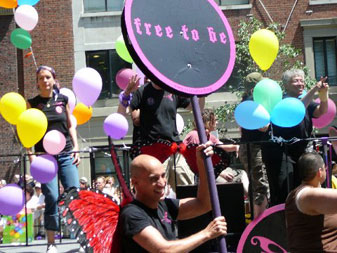Chris at The Eternal Pursuit notes with sadness that the conservative breakaway parishes and clergy within the U.S. Episcopal Church, who seek to put themselves under the authority of foreign bishops who oppose homosexuality, are asking for more than freedom to follow their own conscience. It’s an all-or-nothing strategy that would delegitimize the existing Episcopal Church in America, thus undermining two mainstays of our 400-year-old Communion: the authority of bishops and the ideal of fellowship among Christians with different views. Chris writes:
There are certainly real issues that lead people of faith to disagree. Some of these issues, particularly those around human sexuality, are especially difficult. Some find the scriptures to be very clear on these issues. Some argue that the overarching message of the Bible seems in conflict with a few particular passages. On all fronts, some argue that the Bible alone is the sole authority, and others seek a mediated dialogue with the scriptures. Some seek a definitive type of authority in the governance of the Church, and some are tolerant of more ambiguity.
These are all developing edges for the Episcopal Church, and we are not alone, as Christians, in this. The point is that the Minns and Akinola crowd are not seeking resolution or reconciliation. They are seeking to leave with as much of the property of ECUSA as they can take with them, and replace the existing church.
The word reform implies, rightly, that the Church could always be more faithful. The Church could always live closer to the foot of the cross of Christ. At various points in history, the Church has erred grievously, and most certainly will again. The Church has endured, because people of faith have worked to reform her. We can’t just dispose of an historic expression of the faith, because we disagree.
When conservatives call this a battle over the authority of Scripture, I have to wonder whether they’re applying a legalistic definition of authority, one in which the entire book stands or falls by your attitude toward a single verse. This is how St. Paul described the futility of obedience to the Law without Christ: fail in one particular, and you’re guilty of them all.
We saw this in previous generations with six-day creationism, another modernist blunder that whose lasting legacy was to perpetuate a stereotype of Christians as rigid, ignorant yahoos. The issue for which so many preachers were willing to raise their blood pressure was totally unimportant, in itself, to most people’s lives. Who cares how long it took to create the universe? It’s not a pizza delivery; you don’t get a discount if it’s not ready in half an hour. No, it’s the
principle of the thing, they say.
Similarly, homosexuality presents an abstract principle that the majority can safely denounce or defend without any personal cost to themselves. But when we do this, we send the message that Christianity is about purity, crystalline doctrinal perfection, a completely transparent and authoritative system that is somehow also so fragile that a single pebble can shatter our glass house. The corollary, as the Pharisees would have understood, is that we can’t worship with people whose hands aren’t as clean as ours.
If Christianity is anything distinctive at all, it is the complete opposite of that attitude. “Garlic and sapphires in the mud,” as T.S. Eliot wrote. We should be very, very careful before disfellowshipping someone because they disagree with us on matters not necessary to salvation.






